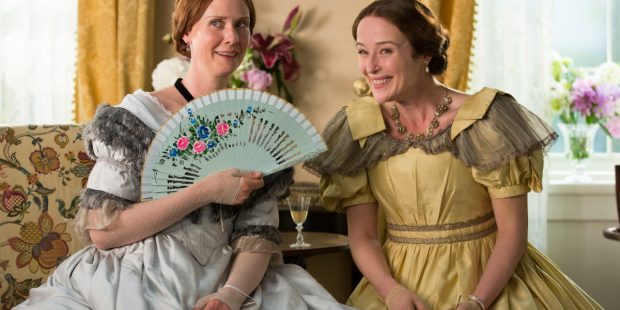The Gist:
Audiences are taken back in time to the 19th-century lifestyle of renowned poet, Emily Dickinson (Cynthia Nixon); a time where the United States saw the birth of the Women’s Rights Movement.
Our film opens with Emily’s expulsion from the Mount Holyoke Female Seminary when her stubborn and ‘ahead of her time’ attitude displeases her tutors. Emily returns to her family home in Massachusetts to live with her doting father (Keith Carradine), recluse mother (Joanna Bacon), older brother (Duncan Duff), and younger sister (Jennifer Ehle). Upon her return home, Emily turns immediately to poetry and, with the blessing and assistance of her father, submits some work to a local paper. However, her father’s blessing proves to seemingly only be the actions of a parent pleasing his daughter’s whims as he pushes for her to adopt a more conventional ‘female profession’.
Years pass and Emily’s defiant attitude is strengthened by the company she keeps in the outspoken Vryling Buffam (Catherine Bailey). As her siblings thrive, marrying and starting families of their own, Emily remains at home, writing the very poems which are incorporated throughout the film. No matter the suitors which come for her hand, Emily follows in her mother’s footsteps and slowly takes her leave from the outside world.
Unbeknownst to her family, Emily is struggling with both her physical and mental health and her desire to never conform to society’s view on womankind only pushes her further into the life of a recluse. With her life deteriorating around her, the only constant and solace left in Emily’s world is her poetry.
The Review:
Oh, I had such high hopes for this film being a recent “English” graduate. The promise of a film focusing on such a significant voice in the writing community was exciting, to say the least. However, there are numerous aspects of the film which dampened such excitement during my initial viewing.
The film opens with a defiant young girl who is too opinionated and witty for her own good. Immediately, the audience is intrigued at how this girl will survive in such a male-driven time. But, soon after, this defiance disappears when Emily returns home and her main focus is asking permission on how to spend her evenings. Nothing promiscuous! She just wants to write her poems at night. In my opinion, that is completed disregarding the Emily from mere moments ago; an Emily who had no care for pleasing her authority figures.
This sequence is soon followed by a transition depicting the Dickinson children growing throughout the years. Such sequence is portrayed in the style of various portraits – a very effective piece of cinematography given the film’s setting and era! However, the effect was dampened as it wasn’t clear just what was happening until the children progressed in age. The parental characters didn’t seem to age a day in this transition which made the entire sequence misleading given how drastically Emily and her siblings changed – a fair few years were added on to their characters!
Considering such disappointing features had occurred barely a quarter way through the film’s running time, the director would’ve had to pull out all the stops to regain my excitement. Unfortunately, this was not the case.
Emily Dickinson – the poet, not the film’s portrayal – was constantly troubled by the looming promise of death for herself and those surrounding her. Such a torment influenced her outlook on life and the poetry we have come to love. Nixon’s portrayal of Dickinson does not delve into the haunted mindset of the poet, thus providing us with a protagonist who appears defiant only to scorn the authority of the men in her life. The only time we get an insight to the deteriorating mental health of this character is in the latter half of the film following the death of her parents.
Another vital aspect of the poet’s life which was restricted throughout the film was the few close relationships she kept in her dark days aka. the relationship between Dickinson and her sister-in-law. Only after Nixon’s character witnesses her brothers’ adultery and loses her best friend to the life of a married woman do we get a hint at the disturbing depths she considers her closest companions in.
As for the poetry underlining the entire film, it was quite subtle considering the biopic’s subject being one of the most famous female poets. Although lines of the poems are spoken over the film’s action throughout, the actual process behind Dickinson’s words is shown through but a glimpse. With my background in the studies of both English language and literature, I would have appreciated more attention given to the influences and process behind the words.
The Verdict:
If you’ve made it to this point despite my negative review above, you are about to be rewarded. Despite the various aspects, I didn’t enjoy about the film, I blame my prior knowledge to the life and works of Emily Dickinson for my disappointment.
I approached the film with expectations of the plot, character’s portrayal and timeline – all things that someone without prior knowledge would not have when viewing the film. If I were to not have such knowledge, I would have been far more satisfied with the overall story as I would be receptive to learning about this figure with an open mind. Unfortunately, that would be an experience difficult to achieve.
All negative points aside, the film had its fair share of dramatic moments and character developments to appease my cinematic needs. But my love for poetry and literature won out leaving me deflated by the lacklustre of dark truths which underlined the majority of Emily Dickinson’s life and work.
Director: Terence Davies
Starring: Emma Bell, Sara Vertongen, Rose Williams



















No Comments